Renewed system of calls for discovery research proposals in Hungary
Renewed system of calls for discovery research proposals in Hungary
25 January 2018
Modified: 27 February 2018
Reading time: 5 minute(s)
Through increasing resources and new calls announced to support research excellence and projects of researchers below the age of 40, the NRDI Office has delivered on its 2017 promise to renew the system of calls for discovery research proposals – announced József Pálinkás at the RDI Calls Forum on 25 January. Such events are regularly organised by the NRDI Office to improve the quality of research and innovation proposals by sharing assessment experiences.
Presentation by József Pálinkás, President of the NRDI Office: Review of Competitive RDI Calls - Forum for Applicants and Evaluators on calls promoting discovery research (PDF, 3038 KB)
- The total amount in the calls published to support discovery research from the National Research, Development and Innovation Fund continuously increased from HUF 7.9 billion (EUR 25.5 million) of 2015 to HUF 16.5 billion (EUR 53.5 million) this year.
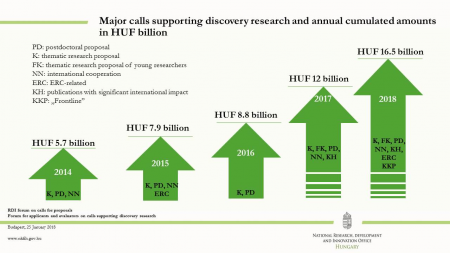 |
- With new constructions to fit various career stages of researchers, new possibilities of submitting proposals emerged in 2017 for researchers below the age of 40. While 34 thematic research proposals of researchers below the age of 40 were supported in 2016, 119 new projects could start in 2017 under the direction of researchers below the age of 40 with support from the call for thematic research proposals or the call for thematic research proposals of young researchers. These schemes were published in January 2018 again.
- In the three major calls for discovery research proposals (thematic research proposals, thematic research proposals of young researchers, and postdoctoral propgramme), universities received HUF 6.2 billion (EUR 20 million), research institutions of the Hungarian Academy of Sciences received nearly HUF 4.2 billion (EUR 13.7 million) in 2017. The president of the NRDI Office also reviewed the higher education ranking of the grantees in discovery research in 2017 – essentially, the most successful institutions in the calls: Eötvös Loránd University (68 supported proposals), the University of Debrecen (50 supported proposals), and the Budapest University of Technology and Economics (42 supported proposals).
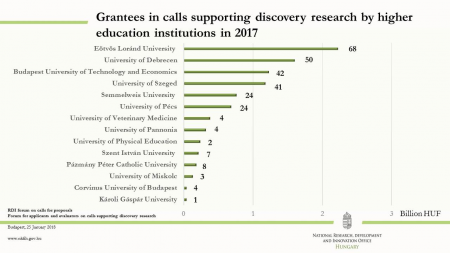 |
- Within the Hungarian system of discovery research funding, the NRDI Office elaborated a structured scheme of calls for proposals from supporting researchers starting their careers all the way to supporting independent research groups.
- In addition to calls open to a wider circle of researchers, excellence programmes support the competitiveness of research projects in the frontline. In the excellence calls, a total amount of HUF 4 billion (EUR 13 million) was awarded in 2017. Among these, the Frontline call aims at the increase and the predictable funding of research groups producing internationally competitive results – 12 research groups were awarded a total amount of HUF 3 billion (nearly EUR 10 million). In the excellence calls, a total amount of HUF 2.2 billion (over EUR 7 million) was awarded to applicants from institutions of higher education, HUF 1.8 billion (EUR 5.9 million) to applicants from the research institutions of the Hungarian Academy of Sciences.
- József Pálinkás added that an amount of around HUF 300 billion (EUR 980 million), out of a total amount of HUF 600 billion (nearly EUR 1 billion) awarded since 2015 from domestic and EU resources for RDI, was targeted to support innovative enterprises, cooperation of enterprises and research institutions, so as to promote projects based on the research, development, and innovation needs of companies.
- The president of the NRDI Office gave a detailed overview on the multi-level system of the evaluation of basic research proposals involving the work of anonymous experts (peers) and review panels, assessed the contribution of the evaluators, and formulated recommendations to enhance the quality of reviews. József Pálinkás also reported that in 2018 the NRDI Office would evaluate the discovery research proposals in a renewed structure of review panels – along the line of internationally significant evaluation practices, e.g. that of the European Research Council (ERC).
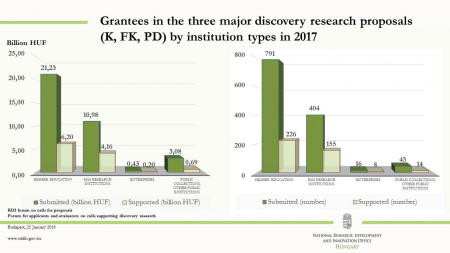 |
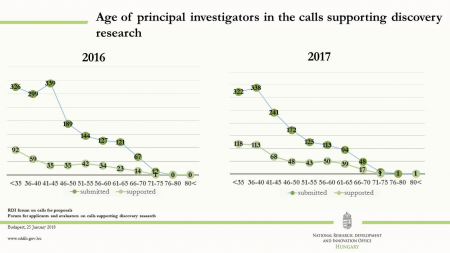 |
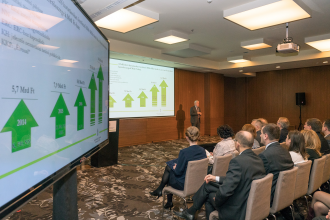 |
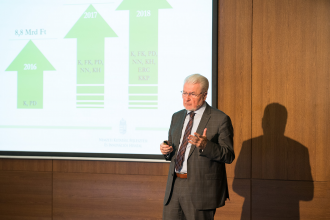 |
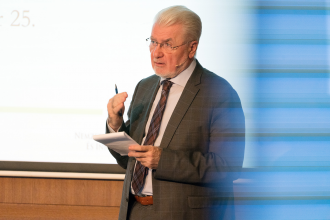 |
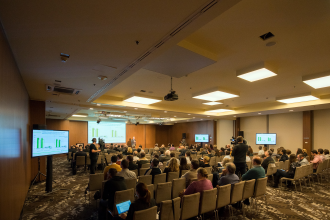 |
Updated: 27 February 2018






